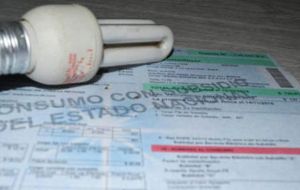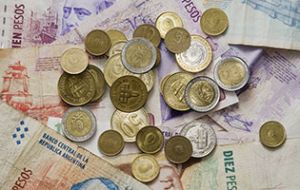MercoPress. South Atlantic News Agency
Argentina ends power subsidies; some bills could increase by as much as 500%
 Minister Aranguren said the target was reducing subsidies by US$4 billion this year as part of a drive to reduce a gaping deficit that widened sharply
Minister Aranguren said the target was reducing subsidies by US$4 billion this year as part of a drive to reduce a gaping deficit that widened sharply  “The subsidies for the generation of electricity in 2015 was around US$10 billion, which is just under 2 points of GDP” Aranguren told a news conference.
“The subsidies for the generation of electricity in 2015 was around US$10 billion, which is just under 2 points of GDP” Aranguren told a news conference.  As of Monday a household in the capital which consumed 180 KW per month would see its bill rise to 150 pesos from 25 pesos “roughly as a cup of coffee”.
As of Monday a household in the capital which consumed 180 KW per month would see its bill rise to 150 pesos from 25 pesos “roughly as a cup of coffee”.  “Argentina has spent US$51 billion on power subsidies since 2003”, Aranguren revealed.
“Argentina has spent US$51 billion on power subsidies since 2003”, Aranguren revealed. Argentina's energy minister on Friday announced new power rates on the back of subsidy cuts that could see the bills of some consumers jump five-fold, saying that a near total freeze on tariffs in parts of the country for years had left the power grid “on the brink of collapse.”
Minister Juan Jose Aranguren said the government of newly-elected Mauricio Macri targeted reducing subsidies by US$4 billion this year as part of a drive to reduce a gaping deficit that widened sharply under the government of former President Cristina Fernandez.
“The subsidies for the generation of electricity in 2015 was around US$10 billion, which is just under 2 points of GDP” Aranguren told a news conference. “With our new tariff policy...we aim to save $4 billion.” This, he said, “represents 5.6 million in Universal Child Allowance cash transfers”.
In Argentina the federal government only controls rates in the capital and its suburbs. Provincial governments outside of Buenos Aires set their own rates.
Aranguren said the old subsidy system had favored residents of the capital Buenos Aires, who typically pay rates five times lower than in other provinces because rates there have been largely frozen for more than 13 years. Buenos Aires City also enjoys the highest per capita income in Argentina.
“Over the past years, for not having applied the mechanism that in 2006 was agreed by the SIGEN (Comptroller's office) and submitted to Congress, without the Parliament addressing it, users in the capital city and Buenos Aires paid for 5-time lower value compared to the rest of the country,” he explained.
“The situation created a clear deterioration in the service and that led us to declare the energy emergency,” he said.
In practical terms under the new rates, a household in the capital which consumed 180 kilowatts per month would see its bill rise to 150 pesos (US$10.74) from 25 pesos - a price the minister noted was roughly the same as a cup of coffee.
However Aranguren explained the new chart that includes a social tariff will allow certain users to keep subsidies for their power bills on the basis of income and assets owned. There will also be cost-saving incentives for consumers who reduce their consumption from last year.
Leading utility firms Edenor and Edesur, which distribute power to metropolitan Buenos Aires have posted losses in four of the past five fully reported financial years as power rates stayed rock bottom even as inflation surged. While the energy emergency remains effective the power distributors are banned from giving out dividends.
The new rate structure comes after the Argentine government set new wholesale prices for electricity that will apply nationwide from Monday, February first. Aranguren said that the rates would be reviewed again in six months time.
“Argentina has spent US$51 billion on power subsidies since 2003”, Aranguren revealed.




Top Comments
Disclaimer & comment rules-

-

-

Read all commentsThen ordinary argies should start to buy up all the candles,
Jan 30th, 2016 - 11:10 am 0they may well need them.
Macri is the Donald Trump Spanish.
Jan 30th, 2016 - 11:43 am 0Subsidies? Uruguay sells power to RA @ 7 dollars a megawatt but buys from the wind farms @ 69 dollars. See article in El Observador. Who pays the difference? The Uruguayan consumer every month.
Jan 30th, 2016 - 11:58 am 0Commenting for this story is now closed.
If you have a Facebook account, become a fan and comment on our Facebook Page!